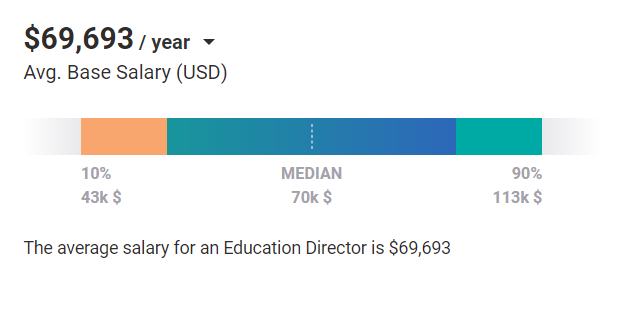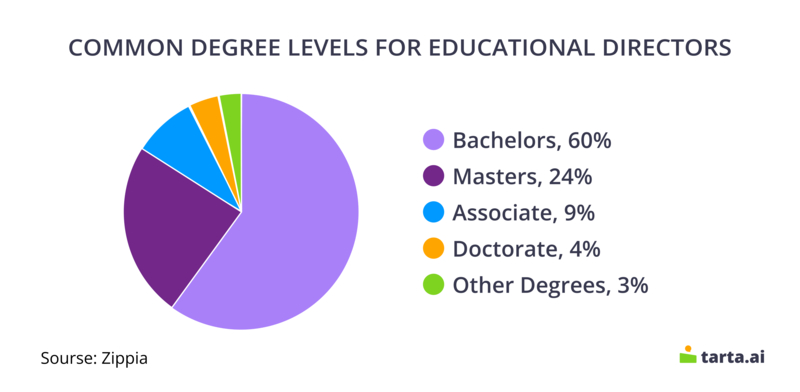The Role of Education Directors: Shaping the Future of Education

"Education is not the filling of a pail, but the lighting of a fire." - W.B. Yeats
Job Description
An Education Director is a senior management position responsible for overseeing the educational programs and policies of an organization or institution. Education Directors are found in a variety of settings, including schools, universities, non-profits, and government agencies.
General Information
Education Directors typically hold a Master's or Doctoral degree in education, educational leadership, or a related field. They are experienced educators with a deep understanding of pedagogy, curriculum development, and educational policy. Education Directors work collaboratively with administrators, teachers, parents, and other stakeholders to ensure the success of educational programs.
Requirements
To become an Education Director, candidates must have a minimum of a Bachelor's degree in education, with a preference for those who hold a Master's or Doctoral degree. Additionally, candidates must have several years of experience in teaching, curriculum development, and educational leadership. Some organizations or institutions may also require a teaching certificate or administrative license.
Main Responsibilities
The main responsibilities of an Education Director can vary depending on the organization they work for, but generally include the following:
- Curriculum Development: The Education Director is responsible for developing and implementing educational curriculums that align with the organization's goals and objectives. They must ensure that the curriculum meets state and federal education standards.
- Program Management: The Education Director oversees the day-to-day operations of education programs, ensuring that all programs are running efficiently, effectively, and in compliance with all regulations and guidelines.
- Staff Management: The Education Director is responsible for recruiting, training, and supervising staff, ensuring that they have the necessary skills and training to carry out their duties effectively. They also manage the performance of staff, provide feedback, and create professional development opportunities.
- Budget Management: The Education Director is responsible for managing the budget for the organization's education programs. They must ensure that resources are allocated appropriately to meet the needs of the programs and that spending is in compliance with budgetary guidelines.
- Stakeholder Relations: The Education Director is responsible for building and maintaining relationships with stakeholders, including parents, teachers, administrators, and community leaders. They must ensure that the organization's education programs meet the needs of all stakeholders.
- Educational Assessment and Evaluation: The Education Director is responsible for overseeing the development and implementation of educational assessments and evaluations to measure the effectiveness of the organization's education programs. They must use this information to make data-driven decisions to improve the programs.
- Policy Development: The Education Director is responsible for developing policies and procedures that ensure compliance with all education regulations and guidelines. They must also stay up-to-date with changes in education policy and adjust organizational policies and procedures accordingly.

Photo: Freepik
Additional Duties
In addition to their main responsibilities, Education Directors may also have other duties, such as:
- Hiring and training new teachers and staff
- Developing partnerships with community organizations and businesses
- Coordinating after-school programs and extracurricular activities
- Establishing and maintaining relationships with parents and guardians
- Collaborating with other departments and organizations to ensure that educational programs are aligned with broader organizational goals.
Skills
Hard Skills | Soft Skills |
Curriculum design and development | Leadership and team management |
Educational research and evaluation | Strong communication and interpersonal skills |
Budget management and financial planning | Critical thinking and problem-solving abilities |
Data analysis and interpretation | Adaptability and flexibility |
Proficiency with educational technology and software | Ability to manage multiple projects and priorities |
Did you know?
The first Education Director in the United States was Horace Mann, who served as the Secretary of the Massachusetts Board of Education from 1837 to 1848.
Job Titles for Education Directors in Different Industries
An education director may have different job titles depending on the industry they work in. Here are some examples:
- Nonprofit organizations: Education Program Director, Education Coordinator, Program Director
- Corporate training: Director of Training and Development, Learning and Development Director, Training Director
- Healthcare: Director of Education and Training, Clinical Education Director, Director of Clinical Education
- Government: Education Policy Director, Director of Education Initiatives, Director of Educational Programs
- Higher education: Director of Academic Affairs, Dean of Education, Director of Student Services
These job titles may vary depending on the organization, but they all typically involve overseeing educational programs, developing curriculum, managing staff, and ensuring that educational goals are being met.
Salary

Source: PayScale
According to Payscale, the average salary for an education director in the United States is $69,693 per year. However, this salary can vary depending on a variety of factors, such as location, level of experience, industry, and employer.
Location plays a significant role in determining an education director's salary. For example, education directors working in New York City earn an average salary of $80,670 per year, which is higher than the national average. In contrast, those working in smaller cities or rural areas may earn less.
Factors That Influence Earnings
Several factors can impact an education director's salary, including experience, education, and job location. Education directors with more experience or higher levels of education may command higher salaries. Job location can also play a role in salary expectations, with positions in large urban areas typically paying more than those in rural areas.
Additionally, the type of educational institution can also influence an education director's salary. Directors at private schools or colleges may earn more than those at public schools or community colleges.
Industry and employer also affect an education director's salary. Education directors who work in the healthcare industry, for example, earn an average salary of $87,900 per year, while those working in the nonprofit sector earn an average salary of $80,000 per year.
Ways to Improve Earnings
- Obtain advanced degrees and certifications: Education directors with advanced degrees and certifications, such as a Doctorate in Education (Ed.D.) or a Certified Education Executive (CEE) designation, may have higher earning potential.
- Gain experience in leadership roles: Education directors who have experience in leadership roles, such as principal or assistant principal, may have an advantage in obtaining higher paying positions.
- Work in high-paying industries: Education directors who work in industries that have higher salaries, such as healthcare or corporate training, may have higher earning potential.
- Negotiate salary and benefits: Education directors should be prepared to negotiate salary and benefits, such as health insurance and retirement plans, during the hiring process and periodically throughout their employment.
- Seek out promotions and advancement opportunities: Education directors who seek out opportunities for advancement, such as moving into higher-level management positions or taking on additional responsibilities, may see an increase in their earnings.
- Keep up with industry trends and best practices: Education directors who stay up-to-date with industry trends and best practices may be more valuable to their organization and may have higher earning potential as a result.
It's important to note that improving earnings should not be the only goal for education directors. Providing quality education and achieving educational goals should always be the top priority.
Additional Benefits
- Flexibility: Many education director positions offer flexible schedules, such as the ability to work remotely or set flexible hours, which can be an attractive benefit.
- Professional development opportunities: Education directors may have access to professional development opportunities, such as conferences and workshops, which can help them stay current on industry trends and best practices.
- Job security: Education director positions can be relatively stable, with opportunities for long-term employment and job security.
- Retirement benefits: Many education director positions offer retirement benefits, such as 401(k) plans or pensions, which can be a valuable asset for long-term financial planning.
- Healthcare benefits: Education directors may receive healthcare benefits, including medical, dental, and vision insurance, which can be important for maintaining overall health and well-being.
- Paid time off: Education directors may receive paid time off, including vacation time, sick leave, and personal days, which can provide work-life balance and time for self-care.
Overall, education directors may receive a variety of benefits that can improve their quality of life and help them maintain a healthy work-life balance. It's important to research and compare the benefits offered by different employers when considering education director positions.

Job Environment
The job of an Education Director involves overseeing the academic programs, curriculum, and teaching staff in educational settings. The job environment for an Education Director can vary widely depending on the type of educational institution they work for, such as public or private schools, colleges, universities, or non-profit organizations. In this article, we will explore the job environment for an Education Director, including the settings they work in, the tools they use, and their work schedule.
Description of Setting
Education Directors can work in a variety of settings, such as:
- Schools: Education Directors in schools work in administrative offices, but they may also visit classrooms to observe and evaluate teaching practices. They may also work with students, parents, and other stakeholders to identify and address issues related to academic programs.
- Colleges and Universities: Education Directors in higher education institutions are responsible for developing and implementing academic programs, ensuring compliance with accreditation requirements, and providing professional development opportunities to teaching staff. They may also work with academic departments to promote interdisciplinary learning and research.
- Non-Profit Organizations: Education Directors in non-profit organizations work in offices or community centers, where they develop and implement educational programs for underserved communities. They may also collaborate with other organizations, government agencies, and community leaders to advocate for education reform and policy changes.
Description of Tools
Education Directors use a variety of tools to perform their duties, such as:
- Computer Software: Education Directors use software programs to manage student data, track academic progress, and develop academic programs. They may also use software programs to communicate with staff, students, and parents.
- Communication Tools: Education Directors use email, phone, and video conferencing to communicate with staff, students, parents, and other stakeholders. They may also use social media platforms to engage with the community and promote educational programs.
- Research Tools: Education Directors use research tools, such as databases and academic journals, to stay informed about trends and best practices in education. They may also conduct research studies to evaluate the effectiveness of educational programs and initiatives.
Work Schedule
The work schedule for Education Directors varies depending on the institution they work for and the responsibilities they have. Education Directors in schools typically work during regular business hours, but may also work evenings and weekends to attend school events and meetings with parents and community members. Education Directors in higher education institutions may work longer hours, including weekends and evenings, to accommodate teaching staff schedules and academic events. Education Directors in non-profit organizations may work flexible hours, including evenings and weekends, to accommodate community schedules and events.
Interesting facts:
65.0% of all education directors are women, while 35.0% are men.
The average age of an employed education director is 47 years old.

Photo: Freepik
Education
Bachelor's Degree
Education Directors are required to have a bachelor's degree in education or a related field. A bachelor's degree program in education typically takes four years to complete and includes coursework in teaching strategies, curriculum development, and classroom management. It may also include supervised teaching experience in a classroom setting.
Master's Degree
Many Education Directors hold a master's degree in education or a related field. A master's degree program in education typically takes two years to complete and provides advanced training in teaching strategies, educational leadership, curriculum development, and assessment. Some programs also require students to complete a thesis or capstone project.
Ph.D.
Some Education Directors hold a Ph.D. in education or a related field. A Ph.D. program in education typically takes four to six years to complete and includes coursework in research methods, educational theory, and statistics. Students are also required to complete a dissertation, which is an original research project that contributes to the field of education.
Postdoctoral Fellowship
Some Education Directors may also complete a postdoctoral fellowship, which is a period of additional training and research after completing a Ph.D. fellowship typically lasts two to three years and provides advanced training in research methods, grant writing, and academic publishing.
Professional Associations
Professional associations, such as the Association for Supervision and Curriculum Development (ASCD), National Association of Secondary School Principals (NASSP), or National Education Association (NEA), provide a wealth of resources, networking opportunities, and professional development opportunities for Education Directors. They offer access to research, publications, and conferences that keep Education Directors up-to-date with the latest trends and best practices in their field. Professional associations also provide a forum for Education Directors to connect with peers, collaborate on projects, and share ideas and experiences.
Licenses and Certifications
Licenses and certifications are requirements that Education Directors must fulfill to work in their field. In the United States, Education Directors in public schools must have a state-issued administrator license or certification. The requirements for these licenses and certifications vary by state, but generally include completing an accredited education program, passing an examination, and demonstrating experience and competence in educational leadership.
Other certifications and credentials that Education Directors may pursue include the Certified Education Technology Leader (CETL) certification, which is offered by the Consortium for School Networking (CoSN), and the National Board for Professional Teaching Standards (NBPTS) certification. These certifications demonstrate a commitment to ongoing learning and professional development and are highly valued by employers.

Career Paths
Education Directors have various career paths available to them, both within and outside the education sector. In this article, we will discuss ways of career development, subfields, specialization, and alternative careers and similar jobs for Education Directors.
Ways of Career Development
Education Directors can develop their careers in various ways to achieve their professional goals. Here are some of the ways in which they can achieve career development:
- Continuing Education: Education Directors can pursue continuing education programs to gain new skills and knowledge in their field. This can be done through attending workshops, conferences, or online courses, or by pursuing advanced degrees such as a Master's degree or a doctorate. Continuing education programs can provide Education Directors with specialized knowledge and expertise that can help them to advance in their careers.
- Professional Certifications: Education Directors can earn professional certifications, such as the Certified Education Technology Leader (CETL) or the National Board for Professional Teaching Standards (NBPTS) certification, to demonstrate their expertise in a specific area. These certifications can help Education Directors to differentiate themselves from their peers, gain recognition, and access new career opportunities.
- Professional Development: Education Directors can pursue professional development opportunities within their organizations or through professional associations. This can include attending workshops or training sessions, participating in mentorship programs, or collaborating with peers on special projects. Professional development can help Education Directors to gain new skills and knowledge, build relationships with colleagues, and demonstrate their commitment to their profession.
- Networking: Education Directors can build relationships with colleagues, mentors, and peers within their organization or through professional associations. Networking can help Education Directors to gain new insights and perspectives, access new career opportunities, and build a supportive professional community.
- Leadership Opportunities: Education Directors can seek out leadership opportunities within their organizations or through professional associations. This can include serving on committees, leading special projects, or taking on leadership roles within professional associations. Leadership opportunities can help Education Directors to gain visibility, develop new skills, and demonstrate their capacity for leadership.
- Job Shadowing or Mentoring: Education Directors can benefit from job shadowing or mentoring programs, where they can learn from experienced professionals in their field. This can help Education Directors to gain new insights and perspectives, build relationships with experienced professionals, and gain exposure to new career opportunities.

Photo: Freepik
Interesting fact:
Education directors are 58% more likely to work at education companies in comparison to private companies.
Subfields
Subfield | Age Group/Population Served | Typical Settings |
Early Childhood Education | Birth to age 8 | Preschools, daycares, Head Start programs |
Elementary Education | Grades K-6 | Public or private schools |
Secondary Education | Grades 7-12 | Public or private schools |
Special Education | Students with disabilities | Public or private schools |
Higher Education | College and university students | Colleges, universities, career schools |
Adult Education | Adult learners seeking career or personal goals | Community colleges, vocational schools, centers |
Specializations
- Curriculum Development: Education Directors who specialize in curriculum development are responsible for designing and implementing curriculum that meets state and national standards. They may work closely with teachers and instructional designers to ensure that curriculum is effective and engaging.
- Educational Technology: Education Directors who specialize in educational technology are responsible for integrating technology into instructional practices. They may work with teachers and instructional designers to develop online courses, multimedia resources, and other digital learning tools.
- Assessment and Evaluation: Education Directors who specialize in assessment and evaluation are responsible for designing and implementing assessments that measure student learning and program effectiveness. They may work with teachers and instructional designers to ensure that assessments are aligned with curriculum and instruction.
- Instructional Design: Education Directors who specialize in instructional design are responsible for designing and developing effective instructional materials and strategies. They may work with teachers and instructional designers to ensure that instruction is engaging, effective, and aligned with curriculum and assessment.
- Teacher Professional Development: Education Directors who specialize in teacher professional development are responsible for designing and implementing professional development programs that help teachers improve their instructional practices. They may work with teachers and instructional designers to develop workshops, training programs, and other professional development resources.

Photo: katemangostar/Freepik
Alternative Careers and Similar Jobs
Alternative Careers and Similar Jobs for Education Directors | Description |
School Principal | School Principals are responsible for managing the day-to-day operations of K-12 schools. They oversee teachers and staff, manage budgets, and develop policies to improve the academic performance of students. |
Instructional Coordinator | Instructional Coordinators work with teachers and school administrators to develop and implement curriculum and instructional materials. They may also provide professional development for teachers and evaluate the effectiveness of educational programs. |
Education Consultant | Education Consultants work with schools, school districts, and other educational organizations to provide expertise and advice on curriculum development, teacher training, and education policy. |
Training and Development Manager | Training and Development Managers are responsible for developing and implementing employee training programs for organizations. They may work in corporate or non-profit settings, and may specialize in areas such as leadership development, sales training, or customer service training. |
Education Program Director | Education Program Directors oversee the development and implementation of educational programs in a variety of settings, including schools, universities, and non-profit organizations. They may also manage budgets, staff, and partnerships with other organizations. |
Education Policy Analyst | Education Policy Analysts work with government agencies, think tanks, and other organizations to develop and analyze education policy. They may also conduct research and provide advice on issues such as school funding, teacher training, and education equity. |
College Dean | College Deans oversee the academic programs and administrative operations of colleges and universities. They may also develop policies to improve student retention and academic performance. |
Educational Technology Specialist | Educational Technology Specialists develop and implement technology-based educational programs and tools. They may work in schools, universities, or corporate settings. |
Curriculum Developer | Curriculum Developers design and develop educational materials, including textbooks, lesson plans, and assessments. They may work in a variety of settings, including schools, universities, and non-profit organizations. |
Academic Advisor | Academic Advisors provide guidance and support to students in a variety of settings, including high schools, colleges, and universities. They may also help students develop academic plans and career goals. |
Interesting fact:
There are over 12,665 education directors currently employed in the United States.
Job Market
Demand for Education Directors
The demand for Education Directors is expected to grow in the coming years due to various factors. One of the primary reasons is the increasing emphasis on education as a tool for personal and professional growth. As more individuals seek education to improve their career prospects, the demand for qualified Education Directors will increase.
Another factor that is driving the demand for Education Directors is the changing demographics of the population. With an increasing number of students from diverse backgrounds enrolling in educational institutions, the need for Education Directors who can create inclusive and equitable learning environments is on the rise.
Outlook of Education Directors Job Market
The job market for Education Directors is expected to remain stable in the coming years, with a moderate growth rate. According to the Bureau of Labor Statistics (BLS), the employment of Education Administrators, which includes Education Directors, is projected to grow by 4% from 2019 to 2029, which is about as fast as the average for all occupations.
The outlook for Education Directors may vary depending on the subfield and industry they work in. For example, the demand for Education Directors in early childhood education is expected to grow due to the increased focus on early childhood education programs, while the demand for Education Directors in higher education may be impacted by budgetary constraints and enrollment trends.
Possibilities of Part-Time Job
The possibility of part-time jobs for Education Directors varies depending on the institution and the role. While some institutions may offer part-time positions, others may require full-time commitment due to the nature of the job. Part-time positions may be more prevalent in non-profit organizations and community colleges, where budget constraints and other factors may limit the number of full-time positions available.
Possibilities of Remote Job
The possibility of remote jobs for Education Directors has increased in recent years due to the advancement in technology and the changing nature of work. Remote work may be more prevalent in the field of educational technology, where Education Directors can work from anywhere as long as they have access to the internet and other necessary tools.
However, remote work may not be feasible for all Education Director positions, especially those that require face-to-face interaction with students, staff, and other stakeholders. Remote work may also require a higher degree of self-discipline and time-management skills, as Education Directors need to balance their work responsibilities with other commitments.

Photo: wayhomestudio/Freepik
Job Satisfaction
Rewards:
- Making a positive impact on the lives of students and teachers.
- Being able to develop and implement educational policies and practices that align with your vision for education.
- Having the opportunity to work with and learn from other passionate and dedicated education professionals.
- Seeing the results of your efforts in the form of improved student achievement, higher graduation rates, and more engaged students and teachers.
- Having a sense of fulfillment and purpose in your work, knowing that you are contributing to the betterment of society.
Challenges:
- Managing a large and complex organization with multiple stakeholders, including students, parents, teachers, and administrators.
- Addressing the unique needs of diverse student populations with varying learning styles, backgrounds, and abilities.
- Balancing competing priorities, such as limited budgets, changing educational policies, and staffing shortages.
- Navigating complex legal and regulatory requirements, such as state and federal education laws and regulations.
- Dealing with potential conflicts among stakeholders, including disagreements over policy or budget decisions.
Government Programs
Federal Program | Purpose and Description | Potential Role for Education Directors |
Provides funding to schools with high percentages of low-income students | Work with staff to develop and implement Title I programs and ensure compliance with federal regulations | |
Provides federal funding to states to support the education of children with disabilities | Work with special education teachers and staff to develop and implement individualized education plans (IEPs) for students with disabilities | |
National Science Foundation (NSF) | Provides funding for research and development in STEM education | Apply for NSF grants to develop and implement innovative STEM programs in schools or organizations |
Provides funding for career and technical education programs in high schools and postsecondary institutions | Work with career and technical education teachers and staff to develop and implement programs that prepare students for career success | |
Provides funding to partnerships between high-need schools and institutions of higher education to improve teacher preparation and retention | Work with university partners and school staff to develop and implement programs to improve teacher quality and support | |
Provides funding to schools identified as needing improvement to implement comprehensive school reform strategies | Work with staff and external partners to develop and implement evidence-based strategies to improve academic outcomes for students |
These are just a few examples of the many government programs that can support the work of education directors in improving educational outcomes for students.
- Education Directors are responsible for managing the day-to-day operations, staff, and budget of the programs, while also developing and implementing curriculums and policies that ensure compliance with education standards and regulations.
- To become an Education Director, candidates must have several years of experience in teaching, curriculum development, and educational leadership, along with a minimum of a Bachelor's degree in education.
- Education Directors must have a combination of hard and soft skills, including curriculum design, budget management, and leadership abilities.
- While salaries can vary depending on several factors, including job location, education, and experience, education directors can take steps to improve their earning potential.
- Education Directors can develop their careers through continuing education, professional certifications, professional development, networking, leadership opportunities, and job shadowing or mentoring programs.
- The job market for Education Directors is expected to remain stable with a moderate growth rate.
- Government programs such as Title I, IDEA, the NSF, the Perkins Act, the Teacher Quality Partnership Grant Program, and School Improvement Grants provide funding and support for education directors and the schools and organizations they serve.
FAQ
What is the role of an Education Director?
The role of an Education Director can vary depending on the organization they work for, but generally involves overseeing the educational programs, policies, and practices within that organization.
What qualifications do you need to become an Education Director?
Most Education Directors have a master's degree in education or a related field, as well as several years of experience as a teacher or administrator. Some organizations may also require additional certifications or licenses.
What skills are important for an Education Director to have?
Important skills for Education Directors include leadership, communication, organization, problem-solving, and strategic planning.
What is a typical day like for an Education Director?
A typical day for an Education Director can vary, but may include meetings with teachers or administrators, curriculum development, policy implementation, teacher training, and budgeting.
What are some challenges that Education Directors face?
Limited budgets, changing educational policies, staffing shortages, and cultural or societal differences among students and families.
What are some of the most important responsibilities of an Education Director?
Developing and implementing educational policies and practices, ensuring that teachers have the necessary resources and training to deliver high-quality instruction, and overseeing the budget and finances of the organization.